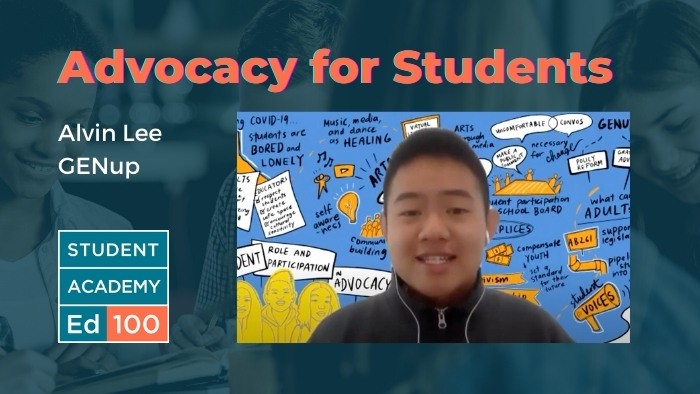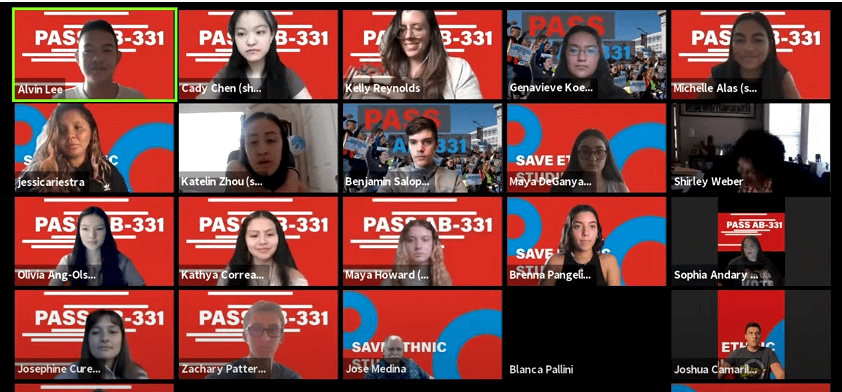How students have a voice

Getting organized
Education researchers who focus on high schools and middle schools have long known the most cost-effective way to accurately find the strengths and weaknesses of a school or school program: ask the students. Students have a lot to offer, if asked.
In an increasing number of schools, students are realizing that they don’t have to be asked — instead they are finding ways to get organized and make their perspectives heard. Online meetings have made it possible for students to be involved in change efforts at a level that was impossible when meetings were held in person and at times that excluded them.
The pandemic triggered very rapid growth in the overlapping networks and platforms that can connect student leaders between and among schools. Almost certainly the largest such network is GENup, a decentralized, chapter-based organization with many independent projects and a broad policy agenda. By participating in GENup, students add their voice and weight to these priorities. They also learn about ways to support specific campaigns and ways to develop their leadership resume by stepping up to leadership roles.
At the 2021 summer conference of the Ed100 Academy for Student Leaders, Alvin Lee, the student founder of the GENup, joined with Michelle Alas to tell students about it:
New paths to leadership opportunities
Many factors contributed to the rapid growth of GENup, including the advantage of being new. Unencumbered by precedent, GENup quickly embraced the power of online meetings and networks.
Lawmakers and state leaders found that GENup offered an efficient way for them to connect with young constituents. For example, one of the motivating issues for many students was a policy to add ethnic studies to the state’s required curriculum for high school. GENup leaders organized virtual student rallies to help students learn about the bill and communicate their support for it with a petition that gathered more than 26,000 signatures. Elected representatives became frequent speakers at GENup events. Student leaders had clear opportunities to demonstrate their leadership skills by participating in the campaign, which was ultimately successful.

GENup grew quickly in part because it developed or supported open-ended collaborative projects that connect with the “real world” rather than existing within the confines of school student government. Parents of ambitious young people know that college admissions officers and employers look for evidence of leadership, so students tend to enjoy moral support at home for their participation.
In less than two years, GENup has racked up a considerable record of success. For example, it supported adoption of the California Seal of Civic Engagement by promoting a pledge campaign. It organized student leaders to provide practical support for students serving on school boards by incubating a new organization, the California Student Board Members Association (CSBMA). The GENup website provides good information about past efforts to help students get involved.
An easily overlooked aspect of GENup’s success has been its decision to connect student leaders in high schools with those in colleges. This alignment might seem obvious, but it is actually pretty rare — K12 and higher education operate quite separately, and there are few organizations that bridge them. The shift happened somewhat organically — some of the student leaders who created GENup as high school students have decided to continue the work as college students. Students are proud of their contributions through GENup, and hundreds have included the organization in their LinkedIn profile.
As a member of the board of advisors for GENup, I have had an opportunity to see the organization grow and mature. The meetings, held every few months, are thoroughly student-run and have become more and more impressive over time. At the end of the 2021 legislative session GENup celebrated its policy wins with a who's-who of policy leaders. (See video.)
Tags on this post
Student voiceAll Tags
A-G requirements Absences Accountability Accreditation Achievement gap Administrators After school Algebra API Arts Assessment At-risk students Attendance Beacon links Bilingual education Bonds Brain Brown Act Budgets Bullying Burbank Business Career Carol Dweck Categorical funds Catholic schools Certification CHAMP Change Character Education Chart Charter schools Civics Class size CMOs Collective bargaining College Common core Community schools Contest Continuous Improvement Cost of education Counselors Creativity Crossword CSBA CTA Dashboard Data Dialogue District boundaries Districts Diversity Drawing DREAM Act Dyslexia EACH Early childhood Economic growth EdPrezi EdSource EdTech Education foundations Effort Election English learners Equity ESSA Ethnic studies Ethnic studies Evaluation rubric Expanded Learning Facilities Fake News Federal Federal policy Funding Gifted Graduation rates Grit Health Help Wanted History Home schools Homeless students Homework Hours of opportunity Humanities Independence Day Indignation Infrastructure Initiatives International Jargon Khan Academy Kindergarten LCAP LCFF Leaderboard Leadership Learning Litigation Lobbyists Local control Local funding Local governance Lottery Magnet schools Map Math Media Mental Health Mindfulness Mindset Myth Myths NAEP National comparisons NCLB Nutrition Pandemic Parcel taxes Parent Engagement Parent Leader Guide Parents peanut butter Pedagogy Pensions personalized Philanthropy PISA Planning Policy Politics population Poverty Preschool Prezi Private schools Prize Project-based learning Prop 13 Prop 98 Property taxes PTA Purpose of education puzzle Quality Race Rating Schools Reading Recruiting teachers Reform Religious education Religious schools Research Retaining teachers Rigor School board School choice School Climate School Closures Science Serrano vs Priest Sex Ed Site Map Sleep Social-emotional learning Song Special ed Spending SPSA Standards Strike STRS Student motivation Student voice Success Suicide Summer Superintendent Suspensions Talent Teacher pay Teacher shortage Teachers Technology Technology in education Template Test scores Tests Time in school Time on task Trump Undocumented Unions Universal education Vaccination Values Vaping Video Volunteering Volunteers Vote Vouchers Winners Year in ReviewSharing is caring!
Password Reset
Search all lesson and blog content here.
Login with Email
We will send your Login Link to your email
address. Click on the link and you will be
logged into Ed100. No more passwords to
remember!














Questions & Comments
To comment or reply, please sign in .